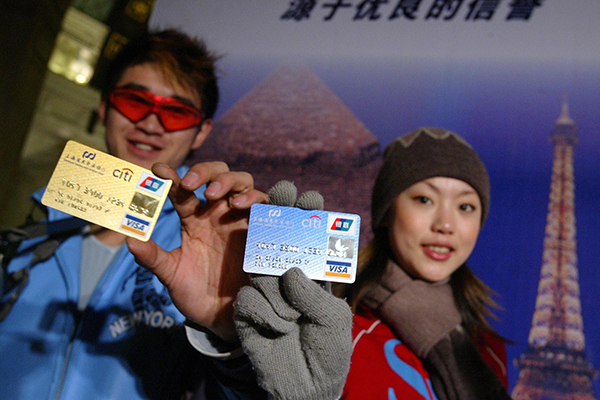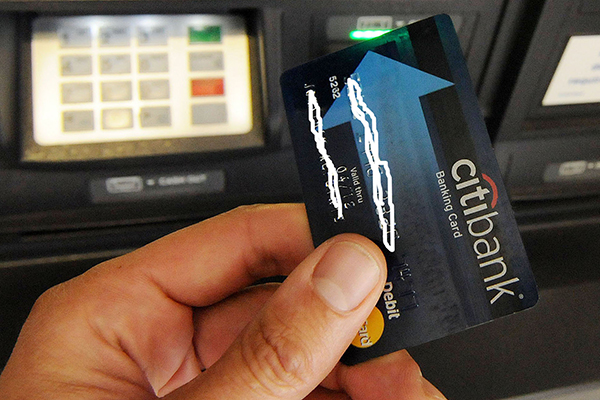 |
|
A Chinese traveler shows her credit card jointly issued by the Shanghai Pudong Development Bank and Citibank. [Photo/China Daily] |
Free rice cookers and suitcases were among the special deals that tempted Chiu Wing-suet into accumulating her 20 credit cards, many of which are crammed into her wallet. She's unlikely to accept any more such offers.
"I've come to realize that most of my cards are useless," said the 30-year-old Hong Kong nurse. "I basically use only one card, for shopping and travel booking online."
The shifting attitude of Asian consumers such as Chiu is upending the economics of the credit-card industry, and banks like Citigroup Inc, HSBC Holdings Plc and Standard Chartered Plc are taking note. The banks, which increasingly rely on the region's swelling number of affluent people to drive profits, are slashing the number of card products they offer in Asia and focusing instead on getting a smaller range of cards adopted for online payments.
In Asia more than elsewhere, consumers are increasing card spending while jettisoning some of their plastic. At 18 percent last year, regional growth in credit-card payments was double the global rate, data from London-based Retail Banking Research show. Yet the actual number of cards in circulation fell in Asia last year even as the worldwide tally increased, RBR estimates.
And that was before Apple Inc began rolling out its mobile-device payment system Apple Pay in Asia.
"The real game now is to get your card to be the one that sits behind the payment platform," said Keith Pogson, a senior partner at Ernst & Young LLP. "The customer doesn't change it. They make a decision once about which card numbers they are going to use in the system. That decision for the banks is critical because it gives them an enormous trade flow of those transactions."
To capture the business, it no longer makes sense for the banks to issue multiple credit-card products in the hope of maximizing usage, especially at a time when they are under pressure to save money. Instead, they are trying to focus on promoting a smaller number of cards, using more targeted benefits such as airline mileage programs and touting the digital features.
 |
|
A Citibank credit card user withdraws money from an ATM in Hong Kong. [Photo/China Daily] |
"What we are trying to do in Asia is to actively and aggressively reduce the number of products with fewer, more powerful and better products," said Sergio Zanatti, head of Asia-Pacific cards and personal loans at Citigroup. "The amount of complexity that you need to manage them just grows and makes our operations more complex."
Citigroup has slashed its number of card offerings in Asia from 270 to just over 100, in line with the 60 percent reduction in global card products, Zanatti said. That contributed to the 12 percent drop in operating expenses at Citigroup's consumer-banking operations in Asia last year.
Asia accounted for almost a fifth of Citigroup's global consumer-banking profit in the first half of this year, the largest contribution outside North America. Asian revenues from Citigroup-branded cards were second only to North America.
HSBC, which has posted billboards all over central Hong Kong to promote its tie-up with Apple Pay, says its number of active mobile-banking clients in the city has jumped almost 50 percent over the past three years-and predicts offerings such as Apple Pay will keep that figure rising. The bank has been offering cash rebates to its cardholders when they make contactless payments at certain retailers in Hong Kong, including through a tie-up with 7-Eleven to promote chicken meals.
"In the world of Apple Pay or Google, consumers will use cards in different ways and we need to ensure our cards and reward programs align with these changing needs," said Kevin Martin, HSBC's Asia-Pacific head of retail banking and wealth management.
HSBC is redeploying as much as $150 billion of assets to Asia and adding some 4,000 jobs in China's Pearl River Delta region with a focus on retail banking and wealth management. The bank, which generates most of its profits from Asia, is preparing to launch its first own-brand credit card in the Chinese mainland later this year.
For Standard Chartered, Asia accounted for close to 70 percent of its operating income in the first half. The London-based bank said earlier this year it had more than 100,000 applications for a new credit card offering air miles and the Apple Pay service in Hong Kong. Reducing the number of credit-card offerings has the added benefit of keeping costs in check.
"With fewer, more standard products and a global digital infrastructure, you also have fewer errors and much less risk-this also reduces costs," said Karen Fawcett, Standard Chartered's retail banking chief executive officer.
Millions of Asians are starting to use credit cards as they join the middle class-and in many cases, almost simultaneously adopting the mobile payment services offered by the likes of Tencent Holdings Ltd. and Alibaba Group Holding Ltd's finance affiliate. China's Tencent has 700-million-plus users on its WeChat messaging platform, where it offers financial services including payments. Alipay has about 450 million users.
"The bigger banks are in attack mode trying to get more customers to use their cards online," said Gary Ng, a partner at PricewaterhouseCoopers LLP who specializes in banking and financial services. "The more cash-based transactions move online, the more likely it is the banks can generate fee income and interest income."
Bloomberg
